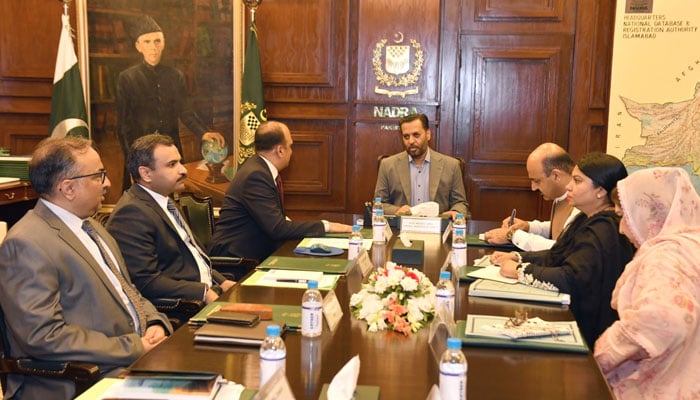CNIC number to serve as national MR for all patients: Mustafa Kamal
Kamal emphasises Pakistan’s largest and most secure citizen database NADRA will serve as backbone of new digital health system
ISLAMABAD: The national identity card number will now serve as the Medical Record (MR) number, announced Federal Health Minister Mustafa Kamal during a high-level meeting with Chairman NADRA, Lieutenant General Muhammad Munir Afsar, marking a significant step toward implementing the government’s “One Patient, One ID” vision.
At the NADRA headquarters, Mustafa Kamal said the move aims to revolutionise Pakistan’s fragmented healthcare system by assigning a single MR number to every citizen, linked to their Computerised National Identity Card (CNIC).
“There is currently no comprehensive data on patients’ medical history in Pakistan. By integrating health records with NADRA’s data, we can ensure seamless access to medical information across the country,” he said.
Mustafa Kamal emphasised that Pakistan’s largest and most secure citizen database—NADRA—will serve as the backbone of the new digital health system.
“Under this system, a patient’s medical history will be accessible from anywhere in Pakistan, at any time,” he stated. The initiative will support better continuity of care, reduce duplication of medical tests, and enhance diagnostic accuracy, especially for patients moving between cities or provinces.
Highlighting the broader vision, Minister Kamal said the Ministry of Health and NADRA will collaborate to expand telemedicine and ensure healthcare services reach people’s doorsteps. “Using modern technology is no longer optional—it is essential,” he said.
“Through telemedicine, we will deliver doctors and medicines directly to people’s homes, especially in remote and underserved areas.”
The health minister acknowledged the growing strain on healthcare infrastructure due to rapid population growth, noting that “seventy percent of people bypass basic health units and go straight to large hospitals, overwhelming these facilities.”
He reaffirmed the government’s commitment to strengthening primary care services and ensuring equitable access to quality healthcare countrywide.
“Promoting digital health can enhance the efficiency, transparency, and sustainability of our health system,” said Kamal, urging policymakers to integrate digital health strategies into national policies. “We must innovate to meet our healthcare needs.”
The meeting ended with the Ministry of Health and NADRA’s commitment to fast-track the unified digital health record system and explore collaboration on mobile health units, biometric access, and smart cards for chronic disease patients.
-
 Chinese New Year Explained: All You Need To Know About The Year Of The Horse
Chinese New Year Explained: All You Need To Know About The Year Of The Horse -
 Canadian Passport Holders Can Now Travel To China Visa-free: Here's How
Canadian Passport Holders Can Now Travel To China Visa-free: Here's How -
 Glen Powell Reveals Wild Prank That Left Sister Hunting Jail Cells
Glen Powell Reveals Wild Prank That Left Sister Hunting Jail Cells -
 Edmonton Weather Warning: Up To 30 Cm Of Snow Possible In Parts Of Alberta
Edmonton Weather Warning: Up To 30 Cm Of Snow Possible In Parts Of Alberta -
 'A Knight Of The Seven Kingdoms' Episode 5: What Time It Airs And Where To Stream
'A Knight Of The Seven Kingdoms' Episode 5: What Time It Airs And Where To Stream -
 Amy Schumer Drops Cryptic Message On First Valentine Amid Divorce
Amy Schumer Drops Cryptic Message On First Valentine Amid Divorce -
 Savannah Guthrie Sends Desperate Plea To Mom Nancy Kidnapper
Savannah Guthrie Sends Desperate Plea To Mom Nancy Kidnapper -
 NBA All-Star 2026 Shake-up: Inside The New USA Vs World Tournament Format
NBA All-Star 2026 Shake-up: Inside The New USA Vs World Tournament Format -
 Warner Bros Consider Reopening Deal Talks With Paramount, Says Reports
Warner Bros Consider Reopening Deal Talks With Paramount, Says Reports -
 Andrew Mountbatten Windsor Faces Future With UK MPs, Says Expert
Andrew Mountbatten Windsor Faces Future With UK MPs, Says Expert -
 Eva Mendes Shared Bedroom Photos For Ryan Gosling On Valentine’s
Eva Mendes Shared Bedroom Photos For Ryan Gosling On Valentine’s -
 Shamed Andrew Told 'nobody Is Above The Law' Amid Harrowing Silence
Shamed Andrew Told 'nobody Is Above The Law' Amid Harrowing Silence -
 Gisele Bundchen Melts Hearts With Sweet Bike Ride Glimpse Featuring Son
Gisele Bundchen Melts Hearts With Sweet Bike Ride Glimpse Featuring Son -
 Prince William Found Meghan Markle ‘quite Refreshing’ At Start
Prince William Found Meghan Markle ‘quite Refreshing’ At Start -
 Kate Middleton Knew Should Could Not Be ‘voice Of Reason’ With Prince Harry
Kate Middleton Knew Should Could Not Be ‘voice Of Reason’ With Prince Harry -
 Rihanna Has Wardrobe Malfunction At A$AP Rocky Fashion Show
Rihanna Has Wardrobe Malfunction At A$AP Rocky Fashion Show




